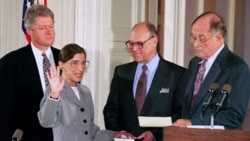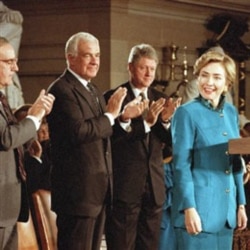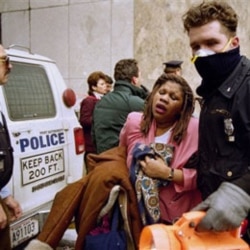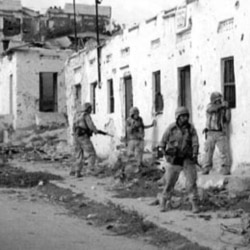STEVE EMBER: Welcome to THE MAKING OF A NATION – American history in VOA Special English. I’m Steve Ember.
This week in our series, we continue the story of America’s forty-second president, Bill Clinton.
(MUSIC)
Bill Clinton took office in January of nineteen ninety-three.
During his eight years as president, he appointed more women and minorities to the government than any president before him. He also appointed the second woman ever to serve on the Supreme Court.
For the first two years of his presidency, Bill Clinton had a Congress controlled by members of his own party, the Democrats. Still, he failed in his efforts to pass legislation to reform the nation's health care system.
During the presidential campaign, Bill Clinton had promised to help millions of Americans get health care coverage.
BILL CLINTON: This health care system of ours is badly broken, and it is time to fix it. Despite the dedication of literally millions of talented health care professionals, our health care is too uncertain and too expensive, too bureaucratic, and too wasteful. It has too much fraud and too much greed. We must make this our most urgent priority – giving every American health security, health care that can never be taken away, health care that is always there.”
He appointed his wife, first lady Hillary Rodham Clinton, to lead a committee to develop the plan. Critics argued that the plan would lead to socialized medicine. In the end, lawmakers decided that the plan would cost too much and would be too difficult to administer.
But President Clinton found support on other issues, including crime-fighting legislation. The measure included money for hiring more police officers and building more prisons.
Congress also passed his budgets for nineteen ninety-three and ninety-four that reduced federal spending.
But Clinton’s relations with Congress became more difficult after the nineteen ninety-four congressional elections. The fight over health care and other issues had only led to greater dissatisfaction with Washington. The elections were a big defeat for the Democrats in Congress.
FRANK SESNO: “A rising tide lifts all boats, or so they say, and Republicans are sailing right to victory in the House of Representatives, CNN estimating that the Republicans will take more than enough seats to take control of the House of Representatives for the first time in forty years, and here’s what’s interesting: It is cutting across all regions, it is cutting across all ages, it is cutting across literally all the candidates.”
CNN reporter Frank Sesno.
Voters gave Republicans control of both the Senate and the House of Representatives for the first time in forty years.
President Clinton supported welfare reform, to reduce spending on public assistance. But he blocked Republican efforts to cut what he believed was too much money from programs including health care for retirees and the poor.
Budget fights with the Republican-led Congress resulted in two shutdowns of government operations.
BILL CLINTON: “The government is partially shutting down because Congress has failed to pass the straightforward legislation necessary to keep the government running without imposing sharp hikes in Medicare premiums and deep cuts in education and the environment.
“It is particularly unfortunate that the Republican Congress has brought us to this juncture because, after all, we share a central goal -- balancing the federal budget. We must lift the burden of debt that threatens the future of our children and grandchildren. Unfortunately, Republican leaders in Washington have put ideology ahead of common sense and shared values.”
The economy had suffered a recession during the previous administration of George H.W. Bush. After Bill Clinton became president, the economy grew slowly at first, but then recovered more quickly.
(MUSIC)
One month into his presidency, Bill Clinton had to deal with a terrorist attack against the United States.
NEWS REPORT: “There’s been an explosion deep below the one hundred-ten story towers of the World Trade Center in New York City.”
On February twenty-sixth, nineteen-ninety-three, members of al-Qaida attacked the World Trade Center in New York City.
The terrorists left a truck loaded with explosives in an underground parking garage.
NEWS REPORT: “By early afternoon, Lower Manhattan looked like a war zone. Office workers, faces blackened with smoke and soot, hundreds gasping for breath, staggered into the frigid February air.”
The attack killed six people and injured more than one thousand others. The government later captured those responsible for the bombing.
(MUSIC)
On April nineteenth, nineteen ninety-five, terrorists again struck the United States. Only this time, it was a case of homegrown terrorism. The target was the Murrah Federal Building in Oklahoma City, Oklahoma.
NEWS REPORT: “It was an explosion, blowing off the entire north face of that building.”
The bombing killed one hundred sixty-eight people. It was the deadliest terrorist attack ever on American soil, up to that time.
The man behind the attack was Timothy McVeigh, a former soldier who hated the government. He was captured soon after the explosion. McVeigh was tried and, in two thousand one, executed for his crimes. A friend of his, another military veteran, was also involved in the plot and was sent to prison.
(MUSIC)
President Clinton also had to deal with foreign and humanitarian crises.
BILL CLINTON: “A year ago, we all watched with horror as Somali children and their families lay dying by the tens of thousands, dying the slow, agonizing death of starvation, a starvation brought on not only by drought, but also by the anarchy that then prevailed in that country.”
President Bush had sent American troops to Somalia in nineteen ninety-two to assist the United Nations in feeding starving Somalis. Civil war was preventing the people from receiving aid during a drought.
In October of nineteen ninety-three, eighteen American soldiers were killed in a battle in Mogadishu. It happened during a failed raid on a hotel to search for a militia leader.
BILL CLINTON: “This past weekend we all reacted with anger and horror as an armed Somali gang desecrated the bodies of our American soldiers and displayed a captured American pilot, all of them soldiers who were taking part in an international effort to end the starvation of the Somali people themselves.
“These tragic events raise hard questions about our effort in Somalia. Why are we still there? What are we trying to accomplish? How did a humanitarian mission turn violent? And when will our people come home?
“These questions deserve straight answers. Let's start by remembering why our troops went into Somalia in the first place. We went because only the United States could help stop one of the great human tragedies of this time. A third of a million people had died of starvation and disease. Twice that many more were at risk of dying. Meanwhile, tons of relief supplies piled up in the capital of Mogadishu because a small number of Somalis stopped food from reaching their own countrymen.
“Our troops created a secure environment so that food and medicine could get through. We saved close to one million lives. And throughout most of Somalia, life began returning to normal. Nearly a million Somalis still depend completely on relief supplies, but at least the starvation is gone. And none of this would have happened without American leadership and America's troops.
“Let us demonstrate to the world, as generations of Americans have done before us, that when Americans take on a challenge, they do the job right.”
But members of Congress demanded a withdrawal. A few days after the battle, President Clinton ordered American troops to leave Somalia within six months.
(MUSIC)
In nineteen ninety-four, President Clinton sent troops to Haiti to return that country's first democratically elected leader to office. Military officers had overthrown President Jean-Bertrand Aristide three years earlier. That crisis led thousands of Haitian refugees to try to flee to the United States by boat.
(MUSIC)
In nineteen ninety-five, American diplomatic efforts -- as well as NATO airstrikes -- helped produce a peace agreement to end the long and bloody civil war in Bosnia. President Clinton sent American peacekeeping troops to the former Yugoslav republic.
In November of nineteen ninety-three, Congress approved NAFTA, the North American Free Trade Agreement. The agreement ended most import taxes between the United States, Canada and Mexico. It lowered barriers to the flow of goods, services and investments.
President Bush had signed the agreement with Mexico and Canada. American labor unions and environmental groups opposed NAFTA. But Congress approved it, and President Clinton signed it into law.
(MUSIC)
Personal issues from Bill Clinton's past in Arkansas became part of his future as president of the United States.
In the late nineteen seventies, he and Hillary Clinton had invested in a land development company in Arkansas called Whitewater. Others involved with Whitewater were in legal trouble by the time Bill Clinton -- a former governor of Arkansas -- became president.
A former judge who owned a savings and loan bank accused Clinton of pressuring him to make illegal loans to help the company. Clinton denied that. And there were questions and accusations about Hillary Clinton from the years when she worked as a lawyer in Little Rock, Arkansas.
In January of nineteen ninety-four, after a year as a president, Bill Clinton asked Attorney General Janet Reno to appoint an independent investigator. The attorney general named a Republican, Robert Fiske, to look into the activities of the Clintons. But critics accused him of being too friendly to the administration. In August, three federal judges replaced him with another Republican lawyer, Kenneth Starr.
Public opinion was divided about the situation. Some people thought the president and his wife were corrupt. Others thought any accusations of wrongdoing were nothing more than political attacks.
Bill Clinton went on to win a second term in the elections in November of nineteen ninety-six. But new issues about his personal behavior would lead Republicans to try to remove him from office.
Clinton’s second term will be our story next week.
(MUSIC)
You can find our series online with transcripts, MP3s, podcasts and pictures at voaspecialenglish.com. You can also follow us on Facebook and Twitter at VOA Learning English. I’m Steve Ember, inviting you to join us again next week for THE MAKING OF A NATION -- American history in VOA Special English.
___
Contributing: Jerilyn Watson
This was program #229. For earlier programs, type "Making of a Nation" in quotation marks in the search box at the top of the page.






